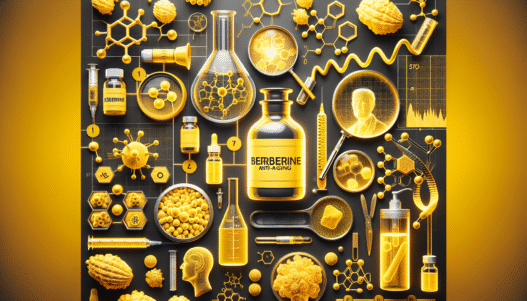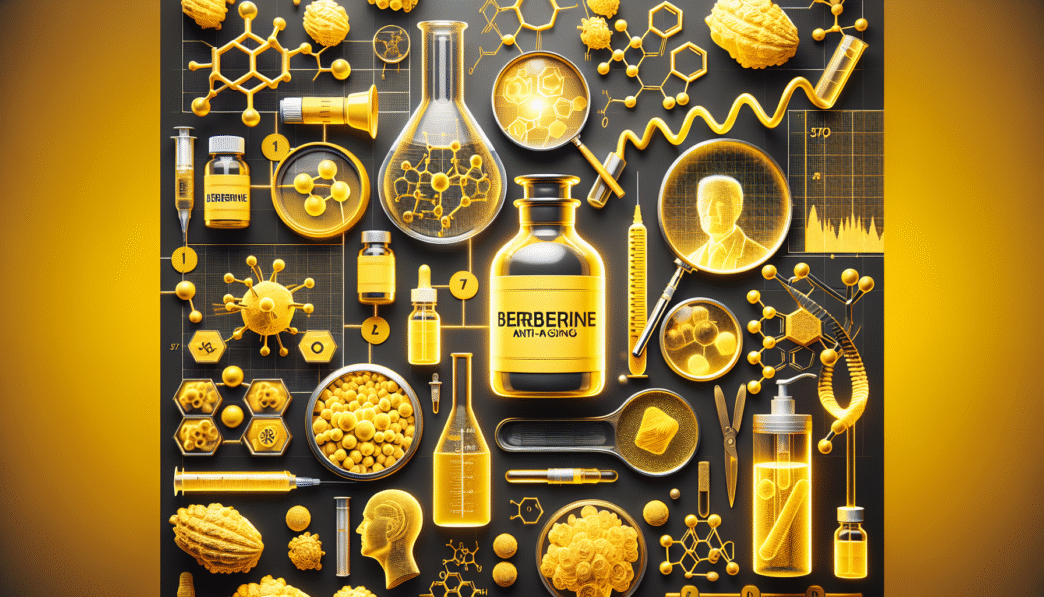Berberine and Anti-aging Research
Berberine is increasingly recognized in the realm of anti-aging research. Its mechanisms and interactions with other medications are crucial aspects to understand for those interested in its potential benefits.
Understanding Berberine’s Mechanisms
Research has shown that berberine can have significant effects on cellular health and longevity. In laboratory studies, berberine has extended the lifespan of mice by approximately 52% in chemotherapy-treated subjects and 16.49% in naturally aged mice. Furthermore, improvements in health span, fur density, and behavioral activity were observed in mice that received berberine orally. This indicates that berberine may have gero-suppressive properties by inhibiting premature, stress-induced cellular senescence.
Additionally, berberine has demonstrated the ability to extend the replicative lifespan and improve cellular morphology in human fetal lung diploid fibroblasts. This suggests a potential role in regulating cell cycles and proliferation, which is critical for maintaining cellular health throughout the aging process. One of the proposed mechanisms is through AMPK activation, which may inhibit mTOR signaling, leading to reduced cellular senescence at clinically relevant concentrations (Aging-US).
Interactions with Medications
Understanding how berberine interacts with various medications is essential, especially for those considering its supplementation as part of their anti-aging regimen. Berberine can affect the metabolism of certain drugs, which may alter their effectiveness. Therefore, individuals using medications, especially those for blood pressure or diabetes, should consult healthcare providers to avoid any adverse effects.
| Medication Type | Potential Interaction |
|---|---|
| Blood Pressure Medications | May increase hypotensive effects |
| Diabetes Medications | Can enhance glucose-lowering effects |
| Cholesterol Medications | May have additive effects on lipid-lowering |
It is crucial for anyone considering berberine supplements to discuss potential interactions with their healthcare provider to ensure safe usage. For further exploration of berberine’s health benefits and dosage recommendations, refer to our articles on berberine benefits and berberine dosage for anti-aging.
The promising findings regarding berberine’s mechanisms and its interactions with medications position it as a noteworthy candidate in the field of anti-aging research. Its ability to enhance cellular health and impact longevity marks it as a significant substance for those interested in holistic wellness approaches.
Berberine’s Impact on Health
Berberine has garnered attention for its diverse health benefits, especially in relation to cardiovascular health, gut health, and its anti-inflammatory properties. This section discusses the promising findings of berberine in these areas.
Cardiovascular Benefits
Research indicates that berberine has significant potential in enhancing cardiovascular health. It has been shown to improve left ventricular remodeling and vasoreactivity in individuals with metabolic syndrome (WebMD). Additionally, it may aid in lowering blood pressure; however, caution is advised when combining it with other blood pressure-lowering medications to avoid excessive drops in blood pressure.
| Outcome | Effect of Berberine |
|---|---|
| Blood Pressure | May lower blood pressure, requiring close monitoring. |
| Ventricular Health | Improves left ventricular remodeling in metabolic syndrome. |
Effects on Gut Health
Berberine has demonstrated considerable benefits in promoting gut health. Studies reveal that it protects the gut barrier from inflammation, kills harmful bacteria, and encourages the growth of beneficial gut bacteria. This multifaceted role makes it a valuable supplement for managing conditions like diabetes and high cholesterol.
| Effect | Description |
|---|---|
| Gut Barrier Protection | Shields gut lining from inflammation. |
| Microbial Balance | Promotes growth of healthy bacteria while combating harmful strains. |
For detailed insights into how berberine influences gut health, explore our article on berberine and gut health.
Anti-inflammatory Properties
Berberine’s anti-inflammatory properties have also been supported by research. It helps reduce oxidative stress, lowers the production of inflammatory proteins, and promotes immune regulation. This suggests that berberine could be effective in managing inflammatory conditions, such as arthritis.
| Mechanism | Effect |
|---|---|
| Oxidative Stress Reduction | Decreases harmful oxidative stress in the body. |
| Inflammation Regulation | Lowers the production of inflammatory proteins. |
For additional details on berberine’s anti-inflammatory effects, visit our section on berberine anti-inflammatory effects.
These health benefits underpin the potential role of berberine in holistic wellness strategies, making it a noteworthy component in the quest for overall health and longevity.
Clinical Applications of Berberine
Berberine has garnered attention for its clinical applications, particularly in managing diabetes and improving cholesterol levels. These applications highlight its potential role in promoting overall health and longevity.
Managing Diabetes
Research indicates that berberine can serve as an effective supportive therapy in the management of type 2 diabetes. A systematic review conducted in 2021 found strong evidence of berberine’s ability to improve insulin resistance by reducing body mass index (BMI) scores and fasting blood insulin levels (Medical News Today).
Additionally, berberine has been shown to regulate blood sugar levels by enhancing the body’s insulin response and inhibiting excessive glucose production by the liver. This mechanism may help individuals with diabetes achieve better blood sugar control. Below is a summary of the effects of berberine on diabetes management:
| Effect | Result |
|---|---|
| Insulin Sensitivity Improvement | Enhanced |
| BMI Reduction | Yes |
| Fasting Insulin Levels | Decreased |
| Blood Sugar Levels | Regulated |
Berberine’s multifaceted approach in managing diabetes makes it a promising addition to traditional treatment strategies.
Improving Cholesterol Levels
In addition to its antidiabetic properties, berberine also shows promise in managing cholesterol levels. Studies reveal that berberine can effectively lower total cholesterol, “bad” LDL cholesterol, and triglycerides in individuals experiencing high cholesterol. It operates through different mechanisms than standard cholesterol medications, which may be beneficial for those who do not respond well to conventional therapies.
A 2021 study involving 84 Chinese men demonstrated significant improvements, with participants taking 500 milligrams (mg) of berberine daily for 12 weeks. The findings indicated greater reductions in total and LDL cholesterol levels compared to a placebo group; however, a slight reduction in HDL cholesterol was also observed. The following table summarizes berberine’s impact on cholesterol levels:
| Cholesterol Type | Change Observed |
|---|---|
| Total Cholesterol | Decrease |
| LDL Cholesterol | Decrease |
| HDL Cholesterol | Slight Decrease |
| Triglycerides | Decrease |
Berberine’s efficacy in both diabetes management and cholesterol improvement positions it as a noteworthy candidate in the realm of berberine anti-aging research. For more information on the health advantages of berberine, visit our article on berberine benefits.
Dosage Recommendations
Burberine is gaining attention for its potential health benefits, particularly in the context of anti-aging. Understanding the appropriate dosages is crucial for maximizing its effects while minimizing risks.
Effective Dosages for Health Benefits
Research indicates that berberine supports healthy glucose metabolism at dosages ranging from 500mg to 1500mg per day. A meta-analysis of 14 clinical studies involving 1,068 participants found that the most common and effective dosage is 1500mg per day, divided into three doses taken with meals (Integrative Pro). Additionally, another meta-analysis highlighted that a dosage of 1500mg per day for 12 weeks positively influences lipid metabolism compared to placebo or standard therapies.
| Study Focus | Dosage (mg/day) | Duration | Outcome |
|---|---|---|---|
| Healthy glucose metabolism | 500 – 1500 | Up to 6 months | Supports glucose control |
| Lipid metabolism | 1500 | 12 weeks | Improves lipid parameters compared to placebo |
| Cognitive dysfunction | Variable | N/A | Improves spatial learning and memory in animal models |
Considerations and Precautions
While berberine has shown promise in various studies, there are several points to consider before starting supplementation. Individuals should consult a healthcare professional to determine the appropriate dosage and ensure that it aligns with their overall health goals.
- Interactions with Medications: Berberine can interact with various medications, particularly those affecting glucose and lipid levels. It’s essential to monitor how it may influence other treatments being used.
- Side Effects: Common side effects of berberine may include gastrointestinal discomfort, diarrhea, and constipation. Starting with a lower dosage and gradually increasing it can help mitigate these effects.
- Health Conditions: Those with existing health issues, particularly related to liver or kidney function, should approach berberine supplementation carefully and under medical guidance. For more information on the impacts on kidney function, refer to berberine and kidney function.
- Long-term Safety: Long-term effects of berberine supplementation are still being researched. Regular assessments and follow-ups with healthcare providers are recommended.
For further insights into the potential benefits of berberine and suggested dosages tailored for anti-aging effects, explore more on berberine anti-aging properties and berberine dosage for anti-aging.
Berberine and Lifespan Extension
The exploration of berberine’s potential for extending lifespan has garnered attention in the field of anti-aging research. Studies indicate that berberine may have significant effects on longevity, particularly through its influence on cellular processes.
Studies on Longevity Benefits
Research has shown that berberine can noticeably extend the lifespan of various subjects. In a study involving naturally aged mice, it was documented that berberine extended their lifespan by approximately 16.49%. This resulted in a substantial increase in their remaining lifespan, jumping from 85.5 days to 154 days. Furthermore, the treated mice exhibited marked improvements in health span, including enhanced fur density and increased behavioral activity (PubMed).
Another notable finding revealed that chemotherapy-treated mice experienced an even greater lifespan extension of around 52% with berberine administration. This indicates that berberine’s effects on longevity are not only significant but potentially affected by environmental and health-related factors, suggesting that berberine could play a role in improving overall vitality and resilience during aging (Aging Cell).
| Type of Mice | Lifespan Increase | Health Improvements |
|---|---|---|
| Naturally Aged Mice | 16.49% | Improved fur density, activity |
| Chemotherapy-Treated Mice | 52% | Enhanced health and vitality |
Effects on Cellular Senescence
In addition to its impact on lifespan, berberine also influences cellular senescence, a critical factor in aging. When A549 cells were exposed to berberine during premature senescence induction, it significantly reduced the characteristics associated with this process. Observations included a reduction in morphometric changes typical of senescence, decreased expression of the p21WAF1 protein, and alterations in mTOR/S6 signaling markers like phosphorylated ribosomal S6 protein.
These findings underscore berberine’s potential mechanism of action in combating age-related cell decline. By targeting the pathways involved in cellular aging, berberine may not only promote longevity but also enhance overall cellular health, making it a promising candidate for further research into anti-aging strategies. For a deeper understanding of how berberine impacts health and longevity, consider exploring our comprehensive articles on berberine benefits and berberine and longevity.





















